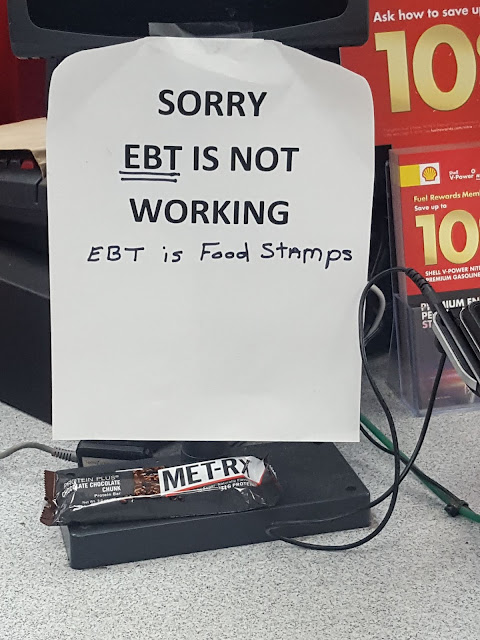By Douglas V. Gibbs
The Supplemental Nutrition Assistance Program (SNAP), formerly known as the Food Stamp Program, while rooted in federal legislation, raises serious constitutional questions about the scope of federal authority. If one takes into consideration the Tenth Amendment of the United States Constitution, if safety nets are to exist, they must be state-driven, not federally imposed.
SNAP is the largest federal nutrition assistance initiative in the United States. It provides monthly benefits to low-income individuals and families to help them purchase food. As of 2025, SNAP serves over 42 million Americans.
The genesis of SNAP reaches back into The Great Depression, with the first Food Stamp Program launching in 1939. The pilot program lasted until 1943 to distribute surplus agricultural goods. In 1961, President Kennedy revived the program with pilot programs. In 1964, the Food Stamp Act was signed by President Lyndon B. Johnson, making the program permanent. The act was considered to be a part of Johnson’s Great Society Initiative – one of several legislative efforts aimed at combating poverty and improving social welfare. He unveiled the concept of his Great Society in a speech at Ohio University on May 7, 1964, expanding it in a speech at the University of Michigan on May 22, 1964. His vision included eliminating poverty and racial injustice, improving education and healthcare, and expanding federal support for the disadvantaged. While on the surface such an endeavor may seem noble, the Democratic President disregarded the fact that the Constitution provides no authorities for the creation of such federal programs, and history would later reveal that it all was not only a failure, but increasing government involvement in these social issues actually made matters worse.
The Food Stamp Act of 1964 was signed into law on August 31 of that year, and was an explicit part of Johnson’s Great Society agenda. The Act received bipartisan support. Federal infiltration into the lives of Americans was expanded the next year with more Great Society programs like Medicare and Medicaid.
In 1974, SNAP became a nationwide program, and between the 1980s and 2000s the program evolved with electronic benefit transfer (EBT) systems and expanded eligibility. To shield SNAP from political volatility and questions regarding its constitutionality the program was hidden in and congressionally authorized through the Farm Bill, a legislative package that also unconstitutionally governs agriculture and food policy.
From a constitutional standpoint, SNAP’s federal administration is problematic. The Tenth Amendment states: “The powers not delegated to the United States by the Constitution, nor prohibited by it to the States, are reserved to the States respectively, or to the people.” The short version? There is no expressly enumerated power in the Constitution granting the federal government authority to fund or administer welfare programs like SNAP. While the General Welfare Clause would be the go-to for most political creatures who support the federal government’s involvement in these kinds of social issues, as revealed by President James Madison’s veto of the Bonus Bill in 1917, the General Welfare Clause was not meant to be a work-around clause that enabled the Congress to pretty much pass any law they want by simply labeling it was for the general welfare. General Welfare, mentioned in the Preamble (which is not legally binding), and in Article I, Section 8 of the Constitution, was supposed to be a result of the federal government operating constitutionally, not a power for them to pass anything as they wish. In other words, if the federal government was operating constitutionally, there would be a state of general welfare (or “all’s well”) throughout the country.
Social welfare safety nets, while arguably important and often necessary, fall under state jurisdiction. If states wish to provide food assistance, they have every right to do so. But the federal government’s involvement, especially through taxation and redistribution, reaches beyond constitutional boundaries.
While the moral imperative to help those in need is clear, as Franklin Delano Roosevelt said regarding his programs, safety nets should be temporary, not a lifestyle. For able-bodied Americans, work requirements or at least proof of job-seeking efforts should be a part of the programs. If I remember properly, this was a part of the reform to welfare during the presidency of Bill Clinton, a contingency recommended by the Newt Gingrich Republicans during the mid-1990s. Such programs containing work requirements, or at least proof of job-seeking efforts, ensures that assistance is a bridge, not a hammock.
Recent legislation, such as the One Big Beautiful Bill Act of 2025, has attempted to tighten work requirements and shift more financial responsibility to the States. While that may be a step toward restoring constitutional balance, reducing federal influence on these programs also angered the Democrats and that disagreement is a part of their hold-out during the latest government shutdown which we are experiencing at this very moment.
During the 2025 government shutdown, SNAP funding ran dry for the first time in its 60-year history. The USDA claimed it could not legally tap contingency funds without preexisting appropriation. However, the courts ordered President Trump to continue payments, citing emergency provisions and the need to prevent mass hunger. Trump’s response criticized the judiciary’s overreach and reiterated that Congress, not the courts, controls the purse strings. He also emphasized that Democrats have been blocking clean funding resolutions, creating the crisis in the first place. He has also, however, been searching for constitutionally-grounded ways he may instruct the executive branch to fund SNAP during the current government shutdown. Ultimately, his primary message to the Democrats has been that the solution is clear: Reopen the government.
The thing about the government shutdown is that it exists because appropriations for funding has lapsed. Yet they are demanding that Trump override appropriation limits to continue SNAP payments. This creates a constitutional and political paradox. These same Democrats and federal judges opposed Trump’s use of impoundment to block spending as recommended by DOGE due to lack of appropriation, yet now demand he pay for SNAP despite a lock of appropriation. Judges have ruled that contingency funds must be used to prevent disruption of food assistance programs, and Trump’s legal team has rightly questioned whether the President has the authority to do so without valid appropriation. Trump, in fact, has asked the courts for constitutional clarification.
In the case of DOGE (Department of Government Efficiency) the Democrats argued that without explicit congressional appropriation, Trump had no authority to fund or continue DOGE’s operations. They blocked funding resolutions and cited the Antideficiency ACT which prohibits federal spending without prior congressional approval.
The contradiction reveals a selective application of constitutional principles on behalf of the Democrats. When it comes to programs they support like SNAP, Democrats argue for broad emergency powers and judicial mandates. But when opposing Trump’s initiatives like DOGE, they invoke strict appropriation limits and separation of powers by violating the latter through using the courts to order Trump’s compliance.
One of the issues at hand is that of the Presidential Power of Impoundment, which is rooted in a constitutional logic shared by constitutional originalists. Impoundment allows the President to refuse to spend funds that Congress has appropriated, especially if doing so would violate fiscal responsibility or constitutional limits. Thomas Jefferson provided the first case of using this power during his presidency when he refused to spend funds on gunboats he deemed unnecessary. A long line of Presidents throughout American History have utilized the constitutional impoundment tool. Richard Nixon used impoundment aggressively. The hatred of Nixon by the Democrats, and their calculated moves to hamstring him once they had him cornered over Watergate, led to the Congressional Budget and Impoundment Control Act of 1974, which unconstitutionally curtailed the practice. While the Act states it limits impoundment, executive discretion over spending is essential to maintaining checks and balances, especially when Congress uses appropriations to push ideological agendas or fund bloated programs.
Constitutionally, while Congress holds the purse strings, the President executes the laws. If a program like SNAP lacks appropriation, the President should not be forced to spend. The courts’ interpretation of emergency powers is also unconstitutional. Not only does the Constitutional contain no asterisks that says it can be suspended for emergencies, the courts don’t have the authority to dictate to the President how he carries out his duties, anyway. If a program like DOGE is blocked by Congress, the President would still constitutionally have the authority to impound or redirect funds.
As SNAP funding dries up, the program’s original mission is being revealed as being violated. The program was established to serve American citizens in genuine need and it is being undermined by abuse, lawlessness, and a flood of ineligible recipients, including illegal aliens. This means that the whole thing goes way beyond being a fiscal crisis. What we have is a serious constitutional crisis as well.
The reality is that as the government shutdown drags on with the Democrats refusing to budge due to their hatred of Trump and unwillingness to let go of issues that Trump was elected to address, millions of families face real hardship. The darker undercurrent, however, is becoming more and more exposed along the way. The system is full of abusers and emboldened by an entitlement culture – and now these people are posting online threats to loot grocery stores and retaliate violently if confronted.
Lawlessness.
Even more troubling is the growing evidence that illegal aliens have tapped into SNAP despite clear federal prohibitions. The 1996 welfare reform signed by President Clinton made it explicit. The programs are “not and have never been available to undocumented non-citizens.” Yet, USDA data reveals that in fiscal year 2022, roughly 1.465 million non-citizens received $4.2 billion in benefits, including individuals who do not meet eligibility requirements. While some of these recipients may be lawful permanent residents or refugees, the data also includes undocumented individuals living in SNAP households, raising serious questions about verification, enforcement, and program integrity. The Biden-era border surge only accelerated this trend, straining state systems and diverting billions from the program’s intended beneficiaries.
Whether one supports federal safety nets or not, SNAP was never designed to serve illegal aliens, nor for the program to become a permanent lifestyle for able-bodied adults. It was meant to be a temporary lifeline for American citizens in genuine need.
From a constitutional standpoint, the federal government has no enumerated authority to administer welfare programs like SNAP. The Tenth Amendment is clear that powers not granted to the federal government are reserved to the States. If food assistance is to exist, it must be state-driven, tailored to local needs, and accountable to local taxpayers.
The current crisis where we have the courts compelling spending without appropriation, where we have abuse and fraud going unchecked, and where we have billions of dollars flowing to ineligible recipients, demands that we conduct a reassessment of both the program’s structure and its constitutional legitimacy.
The unraveling of SNAP during this latest government shutdown is revealing that the program is more than a budgetary failure. It’s a moral and constitutional breach. If we are to restore integrity to public assistance, we must return to first principles: limited federal power, local accountability, and a safety net that serves the vulnerable rather than enabling them. Of course, such changes would need to be done gradually. I don’t believe it is wise to pull the rug out from under people who have developed a dependency on these programs. But, ultimately, they need to be slowly worked back toward being administered by the States, as well as by private and non-profit influences and administration. It may take time, but moving back towards the programs falling more in line with the Constitution is the ultimate solution to constitutionality and ensuring that these programs operate as originally intended and without abuse.
— Political Pistachio Conservative News and Commentary



